Chinese eCommerce Platforms: Guide to The Most Popular Online Marketplaces in China

As a foreigner doing business in China, one of the first things you need to do is to find the right Chinese marketplace. There are many different e-commerce platforms in China, each with its unique set of products and services.
With a population of more than 1.4 billion, there’s no shortage of potential customers for your product or service, as China is the largest eCommerce market in the world. And if you’re looking to expand into new markets, this is one of the best ways to do it!
Cost-Effective Agency
KPI and Results focused. We are the most visible Marketing Agency for China. Not because of huge spending but because of our SMART Strategies. Let us help you with: E-Commerce, Search Engine Optimization, Advertising, Weibo, WeChat, WeChat Store & PR.
In this article, we will cover the top e-commerce platforms where you can sell your products in China and start profiting from the world’s second-largest economy today.
An overview of the Chinese e-commerce landscape
The Chinese e-commerce market is one of the fastest-growing and most exciting markets in the world. Newest technologies, fast-growing cities, and more and more wealthy Chinese citizens keen to shop turn this country into a land of possibilities for Chinese businesses and international brands in the cross-border eCommerce industry.
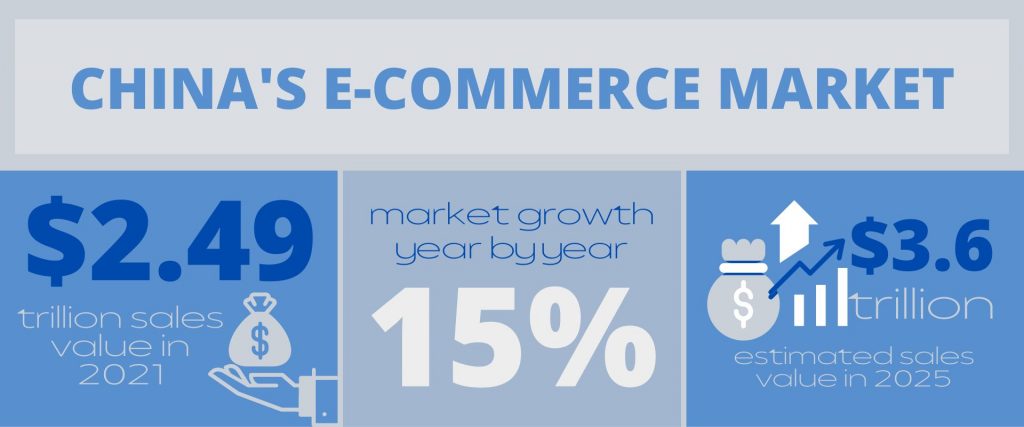
Chinese e-commerce market reached 2.49 trillion dollars in sales revenue in 2021 and is expected to grow up to 3.6 trillion by 2025, with an annual growth rate of 15%. Chinese shoppers are more and more interested in foreign brands and are not afraid to purchase products from international sellers. This leads to the huge popularity of cross-border e-commerce marketplaces, that offer Chinese audiences a variety of high-quality products from foreign brands.
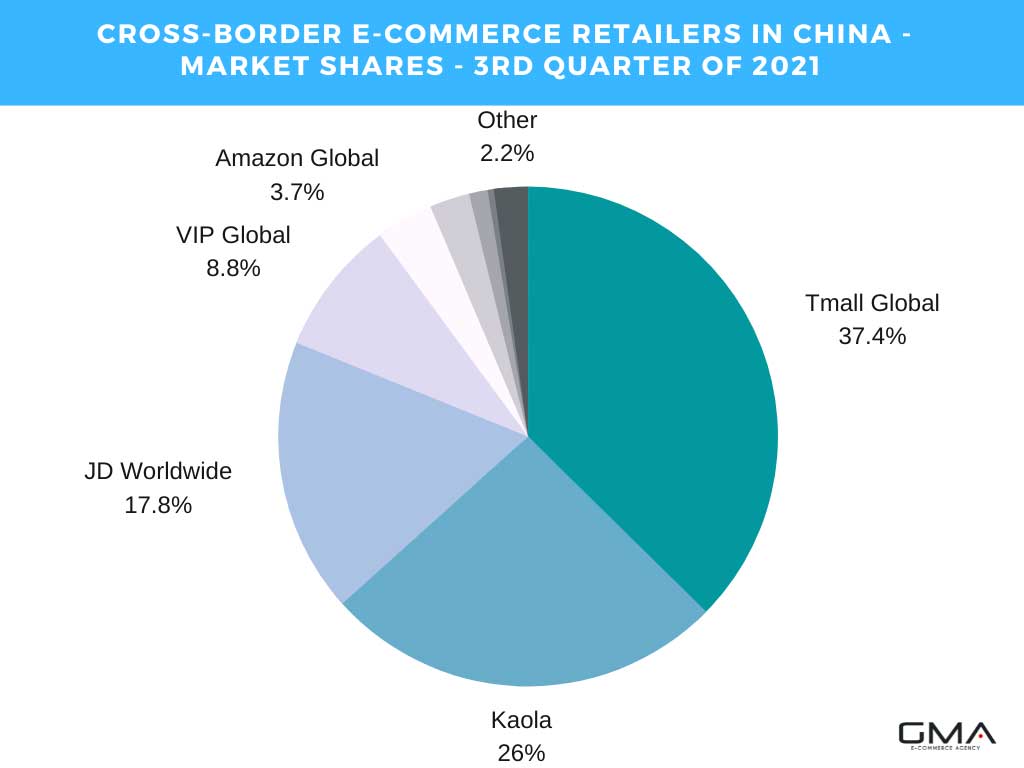
As you can see on the chart above, Tmall Global from Alibaba Group occupies 37.4% of the market, with Kaola, JD Worldwide, VIP Global, and Amazon China following its steps.
But there are also some Chinese e-commerce platforms that sell products from foreign companies to Chinese online shoppers that are worth considering when it comes to online marketplaces in China. Let’s check the most popular Chinese eCommerce platforms.
Taobao & Tmall: the biggest Chinese e-commerce platforms
If you’re looking for some serious online retail sales, there’s no better place than China’s biggest online marketplaces: Taobao and Tmall. With millions of products on offer, it’s hard to imagine any product or service that is not available on those e-commerce websites. But what are these marketplaces, and how do they differ? Let’s take a closer look.
Both Taobao and Tmall are owned by the Alibaba Group, but they offer different services. Taobao is a consumer-to-consumer e-commerce platform, where Chinese individuals sell items to each other. Tmall is a business-to-consumer platform, where businesses can sell products directly to consumers.
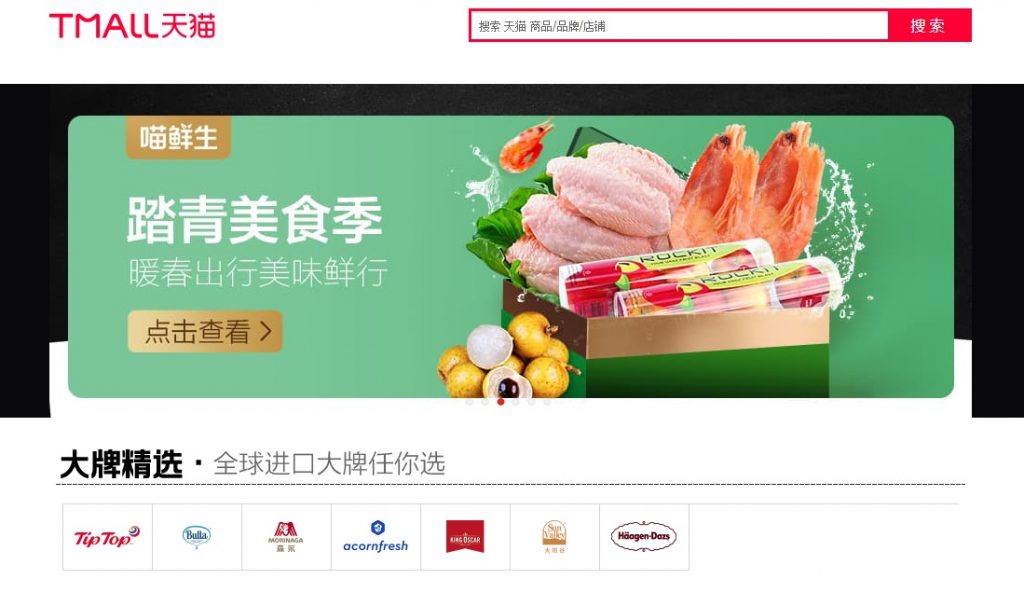
When it comes to cross-border eCommerce marketplaces, Tmall has a platform called Tmall Global, offering Chinese shoppers products from international brands. This way Chinese consumers don’t need to worry about buying counterfeit products instead of original ones, and foreign brand owners don’t need to worry about obtaining a Chinese business license to start selling.
Taobao according to Alizila has around 800 million mobile monthly active users. When it comes to Taobao mall, the platform enables small businesses, customers, and entrepreneurs to operate their businesses by purchasing and selling goods in a very convenient way.
Moreover, consumers on that online platform have the function to communicate with other customers and even receive messages from Taobao vendors in real-time, making it not only an e-commerce platform but also a lifestyle-sharing platform. Sellers can sell their products at auctions or at a fixed price.

To boost sales and promote the platforms throughout the year, Alibaba creates various special promotions. For instance, November 11th is the biggest promotion day for Chinese marketplaces. Alibaba Group started these promotions in 2009 on Tmall online platform, and today 11.11 is the biggest shopping event in the world, as crazy special offers and discounts attract millions of Chinese shoppers every year.
Tmall has seen massive growth in recent years even with the COVID-19 pandemic disturbing global markets. The Tmall Global platform is a major feature within Tmall that allows international brands to open their own online retail store within Tmall and sell directly to Chinese consumers.
This is a huge step forward in cross-border e-commerce between the West and e-commerce in China making the process for global brands to penetrate the Chinese market easier than ever before.

JD: Innovative Chinese Online Marketplace
Jingdong (JD.com) is also known as formerly called 360buy. This online marketplace was founded by Liu Qiandong in 1998. Jingdong is one of the largest e-commerce platforms by transaction volume and revenue in China.
Jindong is also a member of the Fortune Global 500, additionally, this platform nowadays is the main rival of Alibaba-run Tmall.
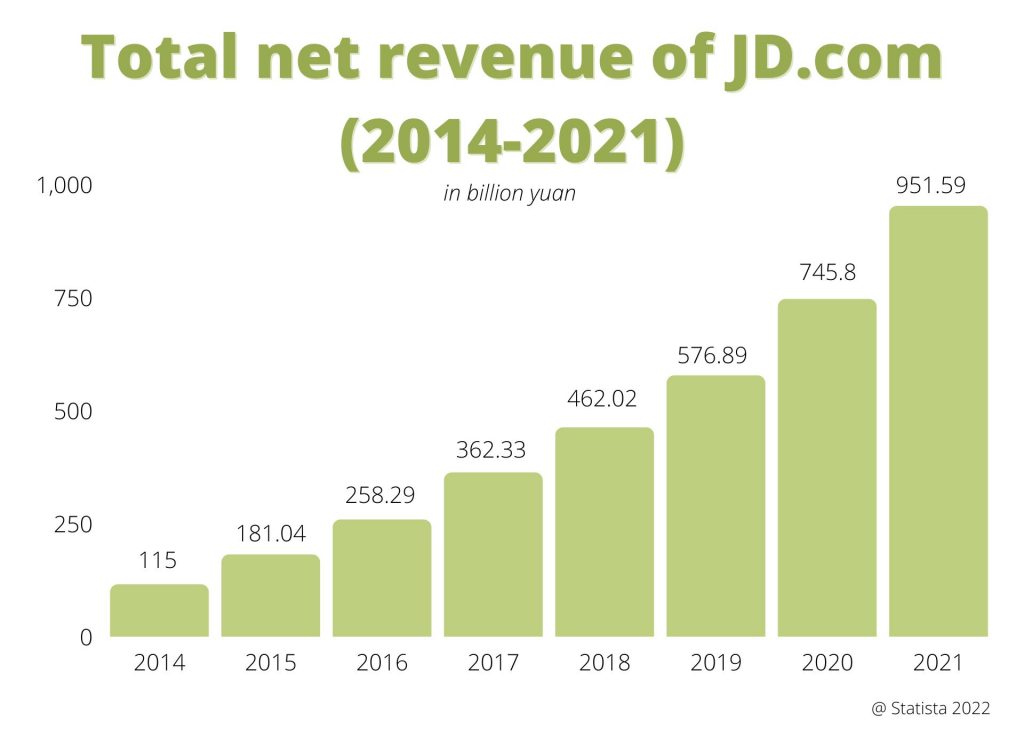
The platform has almost 600 million active users in 2023, which is significant growth from 441.6 million annual active users in 2020. As you can see, JD is a major player in the market.
Moreover, JD.com is the leading company in the world in terms of high-tech and AI delivery through drones, robots, and autonomous technologies.

JD is becoming known for more than just selling high-tech product categories within the Chinese eCommerce market. JD is innovating rapidly in other industries such as the grocery store market (similar to Amazon) which utilizes JD’s digital prowess to improve upon traditional grocery stores.
Jingdong is also gaining traction in a few other key product categories such as vitamins and beauty products. This is helping the company diversify and become a powerful e-commerce tool for consumers.
A sub-platform of JD is JD Worldwide. Similar to Tmall Global, JD Worldwide is a Chinese online eCommerce marketplace that allows global brands to market to Chinese consumers. What differentiates JD from competitors is that they focus on mainly well-established and reputable brands to sell on their platform, which gives them a sense of reliability.

Suning: Offline to Online Chinese Marketplace
Suning Commerce Group is one of the non-government online retailers in China with headquarters in Nanjing, Jiangsu province. Suning operates 1600 stores in 700 cities in China (including Hong Kong S.A.R.) and Japan. Suning pledged 1 billion yuan worth of stock to Alibaba’s Taobao group in 2020 to secure financing and create a new partnership.
This Chinese e-commerce platform is among the top three Chinese B2C companies. Suning provides a variety of services, including physical merchandise such as home appliances, 3C products, books, general merchandise, household commodities, cosmetics, baby care products, content products, and service merchandise with a total number of SKUs exceeding 3 million.
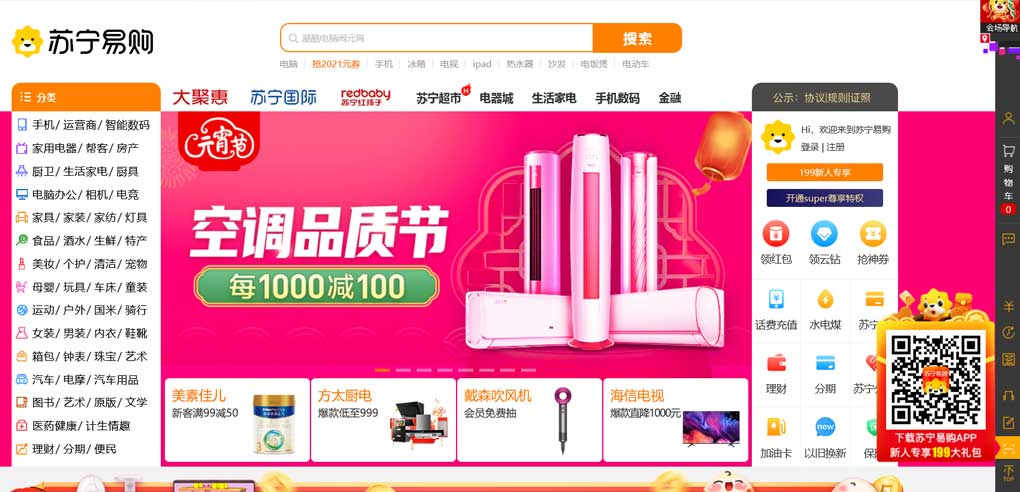
In addition, Suning operates franchised retail shops of electronics appliances in China. Therefore, the company provides services to sell color televisions (TVs), audio and video (AV) players, disc players, refrigerators, washing machines, digital and information technology (IT) products, small household electronics, air conditioners, telecommunications products, and other product categories. In fact, the platform also provides services related to the installation and repair services for electronic appliances.
Suning is one of the digital Chinese online marketplaces that has ventured into brick-and-mortar industries – Suning acquired Carrefour China and has since then introduced appliances into offline stores.
Gome: Electronics Online Retail Sales Platform
Gome Electrical Appliances Holding Limited (国美电器) is the largest privately-owned electrical appliance retailer operated in Mainland China and Hong Kong. The biggest chain store of household electrical appliances platform was founded in Beijing in 1987 by Wong Kwong Yu (Huang Guangyu). However, the brand’s name “GOME” was adopted only in 1993.
Gome started from 3C products but later on, developed into other product categories. This e-commerce website operates an electronics retail chain in China.
Additionally, it runs online retail sales of four major categories which are; maternal and baby supplies, health and medical products, home, and textiles, as well as culture and art supplies. Regarding the Chinese B2C market, Gome has around 2% of the market share.
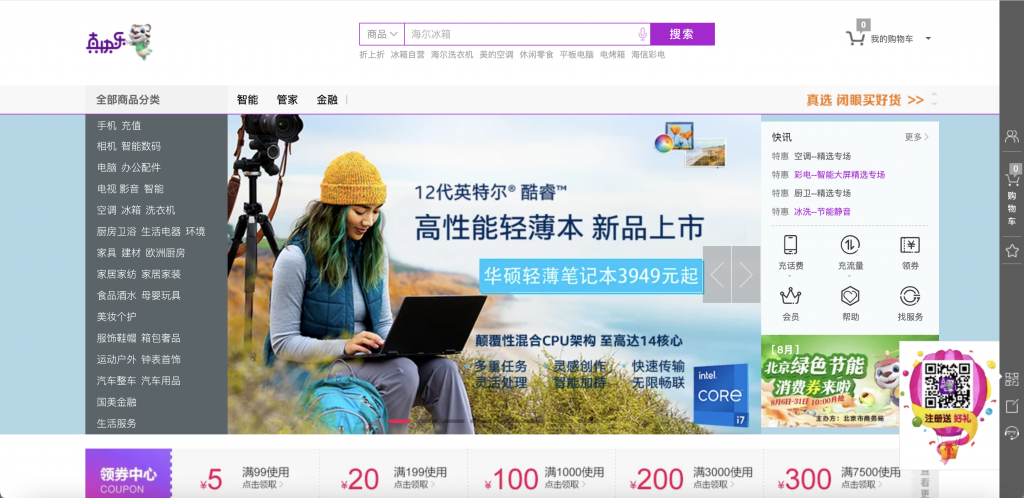
Gome operates in first-tier cities such as Beijing, Shanghai, Tianjin, Guangdong, Xian, and Shenzhen. The platform was featured on Ford’s list of the top 50 enterprises in Asia.
Today Gome is the main competitor of JD and Suning, as this e-commerce online platform gathers online retail shops of electronics and electrical appliances.
In 2020 Gome decided to partner with another e-commerce giant – Pinduoduo. This partnership is a very profitable idea for both companies, but especially for Gome, since they are able to move many of their products onto Pinduoduo’s rapidly growing platform and user base.
Vipshop: flash sales website that is winning Chinese consumers
Vipshop is a Chinese marketplace, which is specializing in online flash sales. Vip Shop has a different business model than other platforms mentioned before. The company buys products from excessive inventory, adds markup, and then sells them with a huge discount, which usually ranges in between 20-80%. Sometimes the discounts can go up to 90%, especially during Chinese shopping festivals, like 11.11 or Chinese New Year sales.
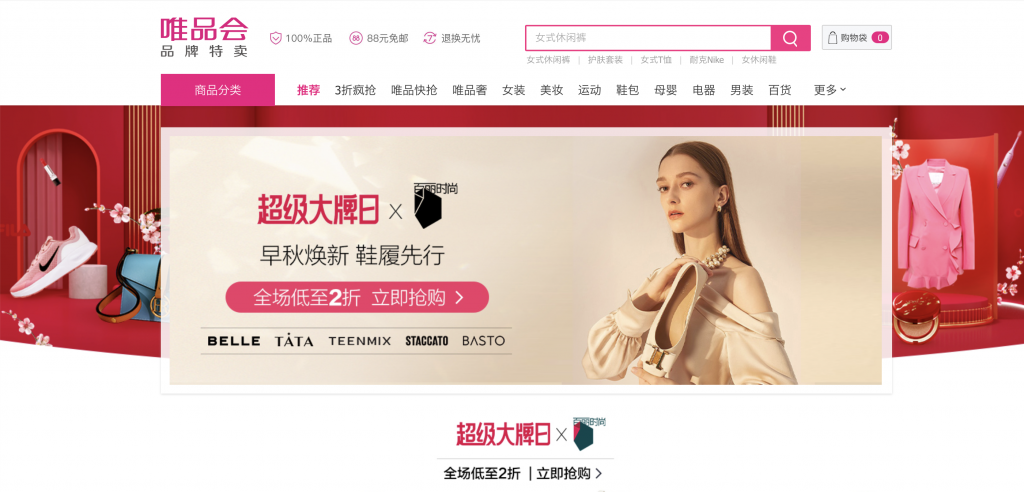
Today Vip Shop is a serious competitor of Tmall and JD, as its popularity is growing every year. Thanks to its business model, this online retailer provides the best deals for products of well-known brands, which attract customers in China.
When it comes to special offers, Vipshop is the leader in the market, since according to the Hangzhou-based supplier, this e-commerce platform shares 90 percent of the market share in the category of special offers.
In comparison to Tmall, which shares 5%, and JD with 10%, Vipshop offers a higher deduction point which fluctuates between 25% and 30 %. This platform also enables suppliers to take advantage of such services as photo shooting, storage, product delivery, and customer services.
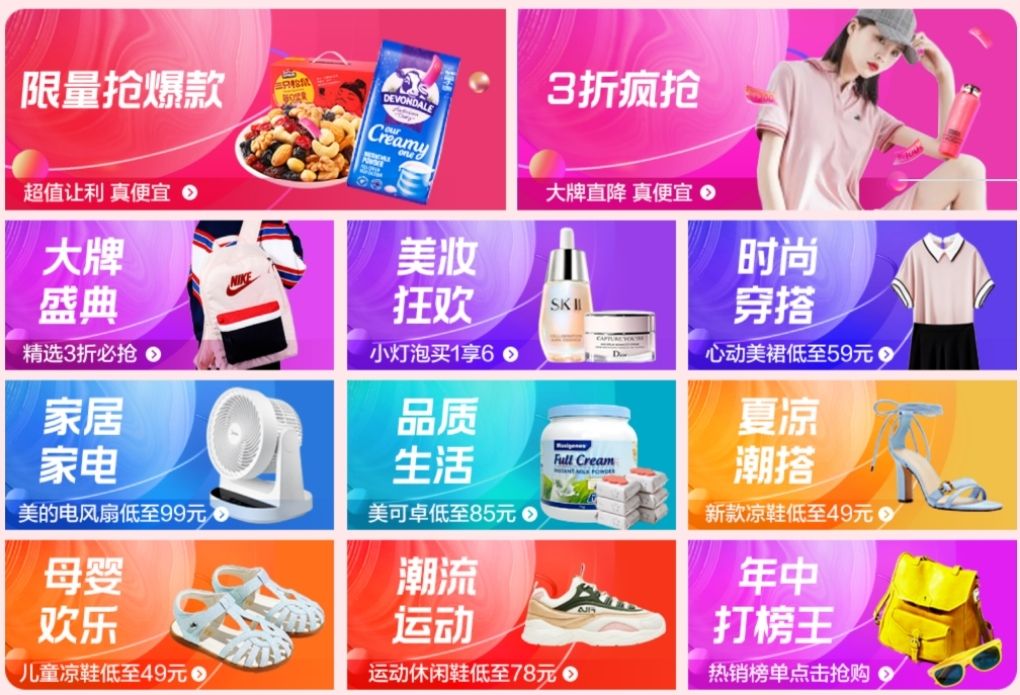
Vip Shop runs a sub-platform called Vip International, which is a competing solution to Tmall Global and JD Worldwide. Vip International is a website for international businesses wanting to set up online stores in the Chinese market. But it’s important to mention that it’s a great choice for big brands, as Chinese customers tend to use this platform to buy from well-known brands with a good reputation in China.
Other Popular Chinese Marketplaces
Apart from the big players in the online marketplace market in China, there are a lot of other Chinese e-commerce platforms that offer eCommerce solutions to domestic and foreign brands. China, being the most populous country in the world, makes room for all kinds of online marketplaces, as the demand is constantly growing, especially for overseas products.
Pinduoduo: Social Ecommerce King
Pinduoduo is an e-commerce platform allowing users to participate in group buying deals. This makes Pinduoduo unique among other Chinese marketplaces in the sense that it is both a social media platform and a consumer shopping experience.
The direct translation of Pinduoduo is “together, more savings, more fun” which alludes well to the platform’s most unique strength: discounted prices from group shopping.
Group buying became especially important in China during several lockdowns in main Chinese cities, especially Shanghai, where people started to organize groups within their buildings, to buy products online. Many other marketplaces already introduced this function in China, but Pinduoduo was the platform that originated with this idea and is still the go-to platform for group purchases.

By offering discounts on group purchases, Pinduoduo incentivizes consumers to share deals and therefore market their service. This makes the service highly popular in lower-tier cities in China where they have gained great traction resulting in over 800 million monthly active users in 2023.
Pinduoduo is an excellent cost-friendly alternative to Tmall and JD for global brands with a smaller budget but who are still willing to make an entry into the cross-border eCommerce industry in China.
Kaola: Biggest cross-border eCommerce app in China?
Kaola, which was acquired by the Alibaba Group in 2019, is a major player in the cross-border eCommerce realm. The focus of this Chinese marketplace is to provide consumers with access to high-quality and high-end global goods. This gives the platform an incredibly good reputation as a reliable source for getting verified products from reputable brands, which is important as Chinese consumers are increasingly savvy and care about getting authentic high-quality products.
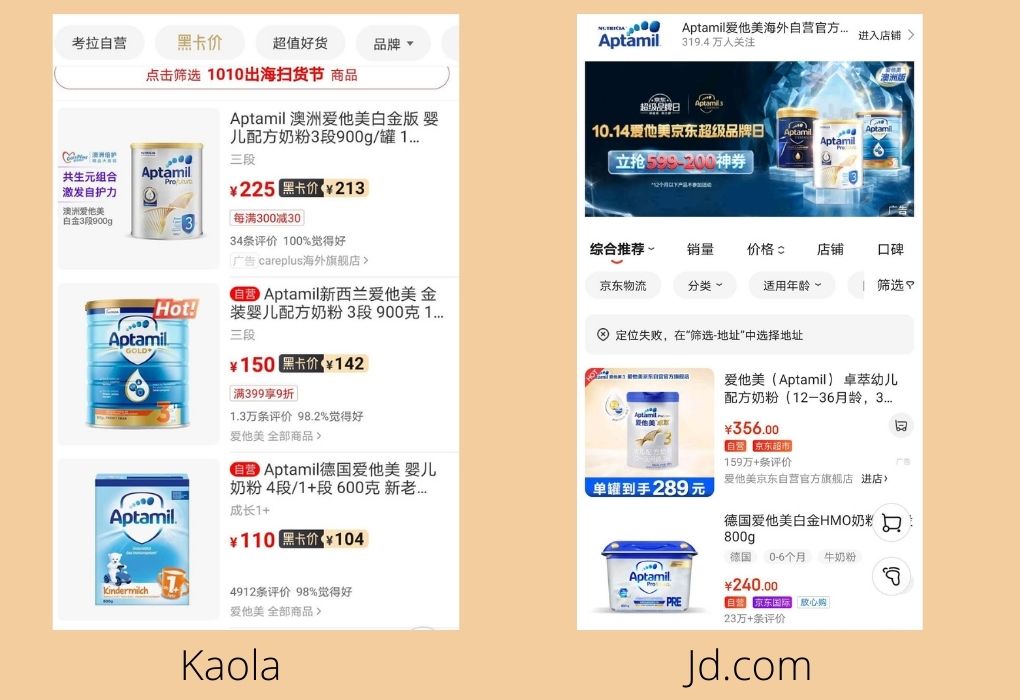
Kaola’s unique distribution model sets it apart from other cross-border eCommerce competitors in the Chinese market. The company has established strong relationships with global brands and therefore is able to purchase inventory directly from those companies. This allows them to bypass any intermediaries which therefore allows them to lower costs for their consumers.
Additionally, Kaola’s platform allows foreign manufacturers to enter China’s complex market. Kaola handles third-party sellers’ logistics along with other significant pieces of the global supply chain that are needed when importing goods to China such as warehousing and after-sales services. This allows the global brands that use Kaola’s platform to have direct China contact and more protection while entering the China market.
What are other ways to sell products online in China?
Although Chinese marketplaces such as Tmall or JD have a huge audience of active users that buy products from them on daily basis, they are not for everyone. If you are a small or medium-sized company that would like to enter the Chinese market but has a small budget, those marketplaces are not a good option for you. They all require rather big initial payments and commission fees. But there are some ways to test the market first and check the demand for your products.
Setting up a WeChat Store
Wechat is the world’s biggest messaging app and social media platform, with 1.26 billion monthly active users in China. It offers a wide range of features, such as WeChat Official Accounts, that work like websites and allows brands to send newsletters to their follower base.
Another feature is WeChat Channels, a competing feature of the Tik-Tok app, allowing users to post short videos within the WeChat app.

Apart from those features (and many more!), one of the game-changers for business is the mini-programs feature of WeChat, which allows companies to build mini-apps within Wechat. Therefore, you can have your own WeChat Shop selling products to the Chinese audience, with the Wechat Payment method linked to your bank account, which allows for cross-border payments.
WeChat Stores are the best option for brands that don’t have a big budget but would like to start selling in China.
It’s also important to mention, that more than 95% of e-commerce companies have their shops in WeChat mini-programs, as it’s already a feature that should not be omitted if you want to succeed in China.
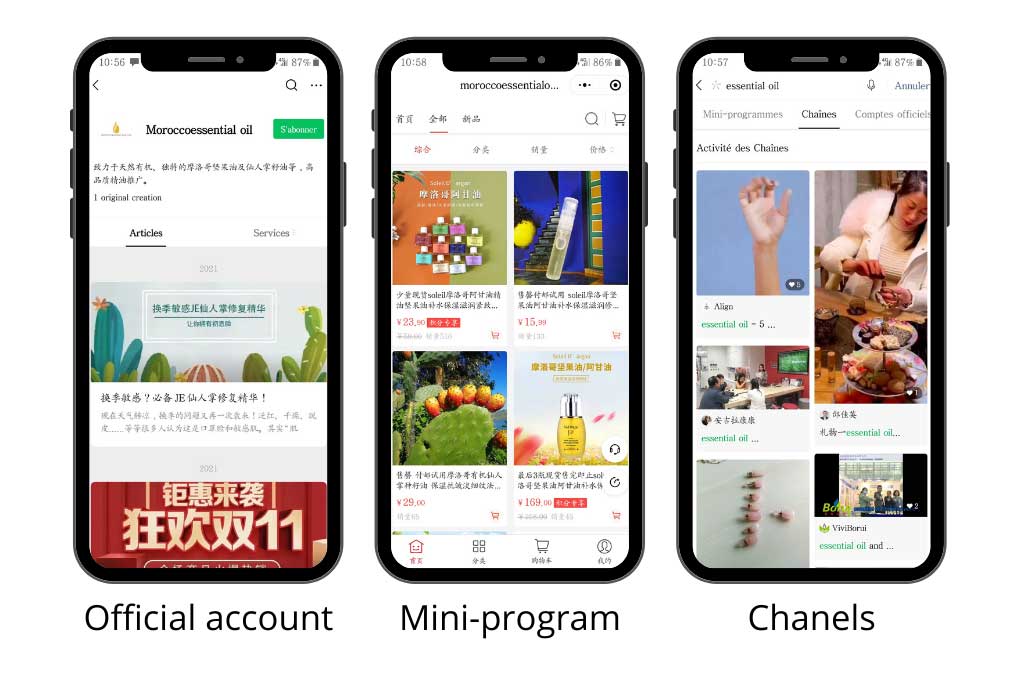
Selling on Chinese social media platforms
In today’s China, social media are the best way of reaching the Chinese audience. Chinese people tend to check opinions and recommendations of the products they want to purchase online, they get influenced by their favorite influencers on social media, and so on. Selling on Chinese social media platforms is a great way of building brand awareness and e-reputation, and the initial investment isn’t as big as on Alibaba marketplaces or JD.

The majority of the most popular social media platforms in China work as super-apps, offering a wide range of features, and online sales are also one of them.
If women are the target audience for your products, try selling on Little Red Book, a platform similar to our Instagram, which has a big influence over Chinese women. If you’re manufacturing products that will be great for Gen Z and younger audiences, try Duoyin – Chinese Tik Tok with its built-in marketplace. There are multiple options to choose from before you move on to big Chinese marketplaces.

Contact us if you’d like to start selling your products in China!
Are you looking to start selling your products in China? If so, we would be more than happy to help you get started! We are the most visible digital agency in China, with a wealth of experience when it comes to doing business in China.

Our team consists of +70 Chinese and foreign professionals who can help you with:
- Chinese public relations
- Branding
- Setting up accounts on Chinese social media
- Registration & Shop/Website design and search engine optimization
- Shop management
- Leads generation
- Customer service
- Marketing strategy
- Performance
… and many more! Contact us or leave us a comment to discuss your project!







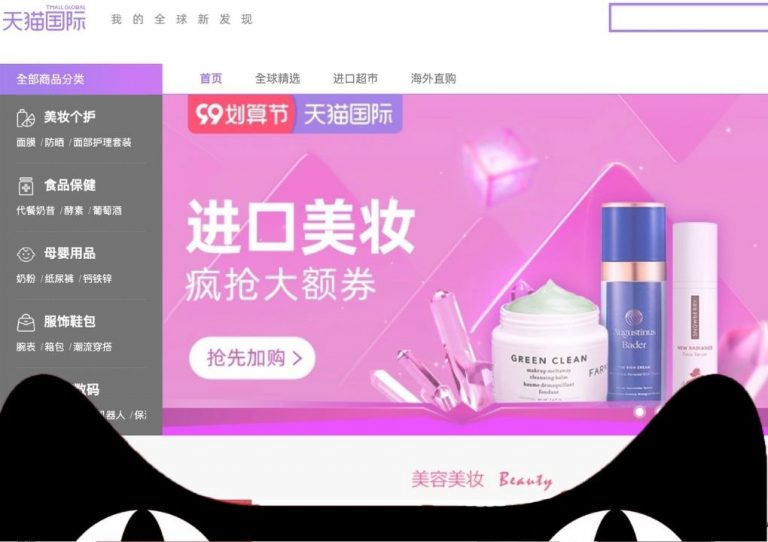
Go Mobile
You forget mobile friendly store and experiences have to be in your Marketing plan if you want to have an impact in China Digital Ecosystem.
According to Mintelsurvey, 87 of Chinese People in tier 1-3 cities used mobile payments in 2017 – up from 69 per cent the year before.
China is Going Cashless…
Alibaba’s cashless strategy show the way forward for consumer-friendly innovation.
Brand retail shops have followed suite soon after they saw the results, Suning and JD.com all have a cashless store, with only Digital Payment.
Amazing article…
I advise you to use WeChat instead of Email…
Do you support dropshipping… I live in Europe.